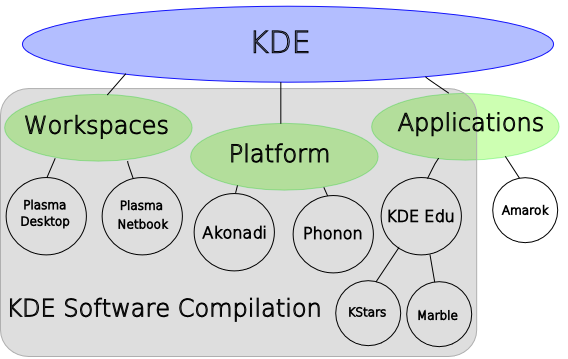Promo/Guidance/Branding/Quick Guide: Difference between revisions
(Added some links) |
(Quick draft) |
||
| Line 10: | Line 10: | ||
=== Terminology === | === Terminology === | ||
'''KDE''' is used exclusively in two meanings: | |||
* KDE, the community, which creates free software for end users | |||
* As an umbrella brand for the technology created by the KDE community | |||
The expansion "K Desktop Environment" is now retired. | |||
'''KDE Workspaces''' | |||
Workspaces provided by KDE. This includes: | |||
* KDE Plasma Desktop, workspace for desktop computers | |||
* KDE Plasma Netbook, workspace suitable for Netbooks and other devices with a small display | |||
'''KDE Platform''' | |||
KDE software is created on the KDE Platform, the base of libraries and services which are needed to run KDE applications. It is used by core and third-party developers to create KDE applications. Especially when including development frameworks and tools it may be referred to as KDE Development Platform. It is built on a number of Pillars: | |||
* Akonadi, storage framework | |||
* Solid, hardware layer | |||
* Nepomuk, information management | |||
* Phonon media framework | |||
'''KDE Applications''' | |||
Applications based on the KDE Platform. Some examples: | |||
* Okular or KDE Okular | |||
* Dolphin or KDE Dolphin | |||
* Amarok | |||
There are a few brands which are used to identify application suites built up from several applications, for example: | |||
* KOffice (KWord, Krita...) | |||
* KDE Kontact or Kontact (KMail, KOrganizer, KAddressbook...) | |||
'''KDE Software Compilation''' | |||
The KDE community does regular releases of a core set of KDE software products (Workspaces, Platform and Applications). These releases are called the KDE Software Compilation and tagged with a version number, e.g. "The KDE community is releasing KDE Software Compilation 4.4". | |||
=== General Guidelines === | === General Guidelines === | ||
Revision as of 00:57, 27 February 2010
Introduction
KDE Branding Cheat Sheet
Some information about the cheat sheet
Overview
Terminology
KDE is used exclusively in two meanings:
- KDE, the community, which creates free software for end users
- As an umbrella brand for the technology created by the KDE community
The expansion "K Desktop Environment" is now retired.
KDE Workspaces
Workspaces provided by KDE. This includes:
- KDE Plasma Desktop, workspace for desktop computers
- KDE Plasma Netbook, workspace suitable for Netbooks and other devices with a small display
KDE Platform
KDE software is created on the KDE Platform, the base of libraries and services which are needed to run KDE applications. It is used by core and third-party developers to create KDE applications. Especially when including development frameworks and tools it may be referred to as KDE Development Platform. It is built on a number of Pillars:
- Akonadi, storage framework
- Solid, hardware layer
- Nepomuk, information management
- Phonon media framework
KDE Applications
Applications based on the KDE Platform. Some examples:
- Okular or KDE Okular
- Dolphin or KDE Dolphin
- Amarok
There are a few brands which are used to identify application suites built up from several applications, for example:
- KOffice (KWord, Krita...)
- KDE Kontact or Kontact (KMail, KOrganizer, KAddressbook...)
KDE Software Compilation
The KDE community does regular releases of a core set of KDE software products (Workspaces, Platform and Applications). These releases are called the KDE Software Compilation and tagged with a version number, e.g. "The KDE community is releasing KDE Software Compilation 4.4".
General Guidelines
Examples
Useful links
- http://dot.kde.org/2009/11/24/repositioning-kde-brand - Dot story about the rebranding
- http://community.kde.org/Promo/Branding - Promo wiki page
- http://community.kde.org/Promo/Strategy/DosDonts - Dos and Donts
- http://www.asinen.org/2009/12/how-to-stop-worrying-and-love-the-rebranding/ - Examples

